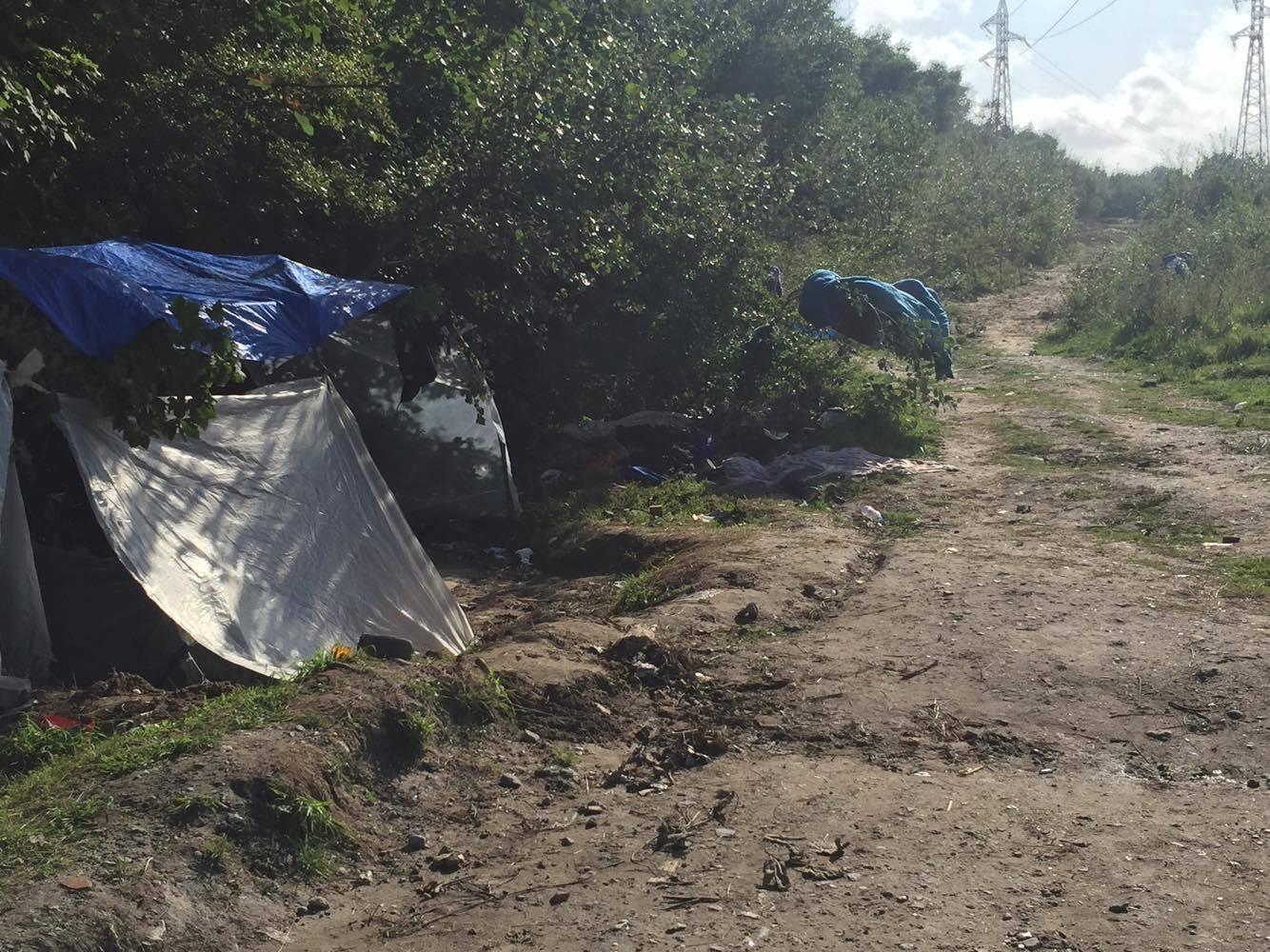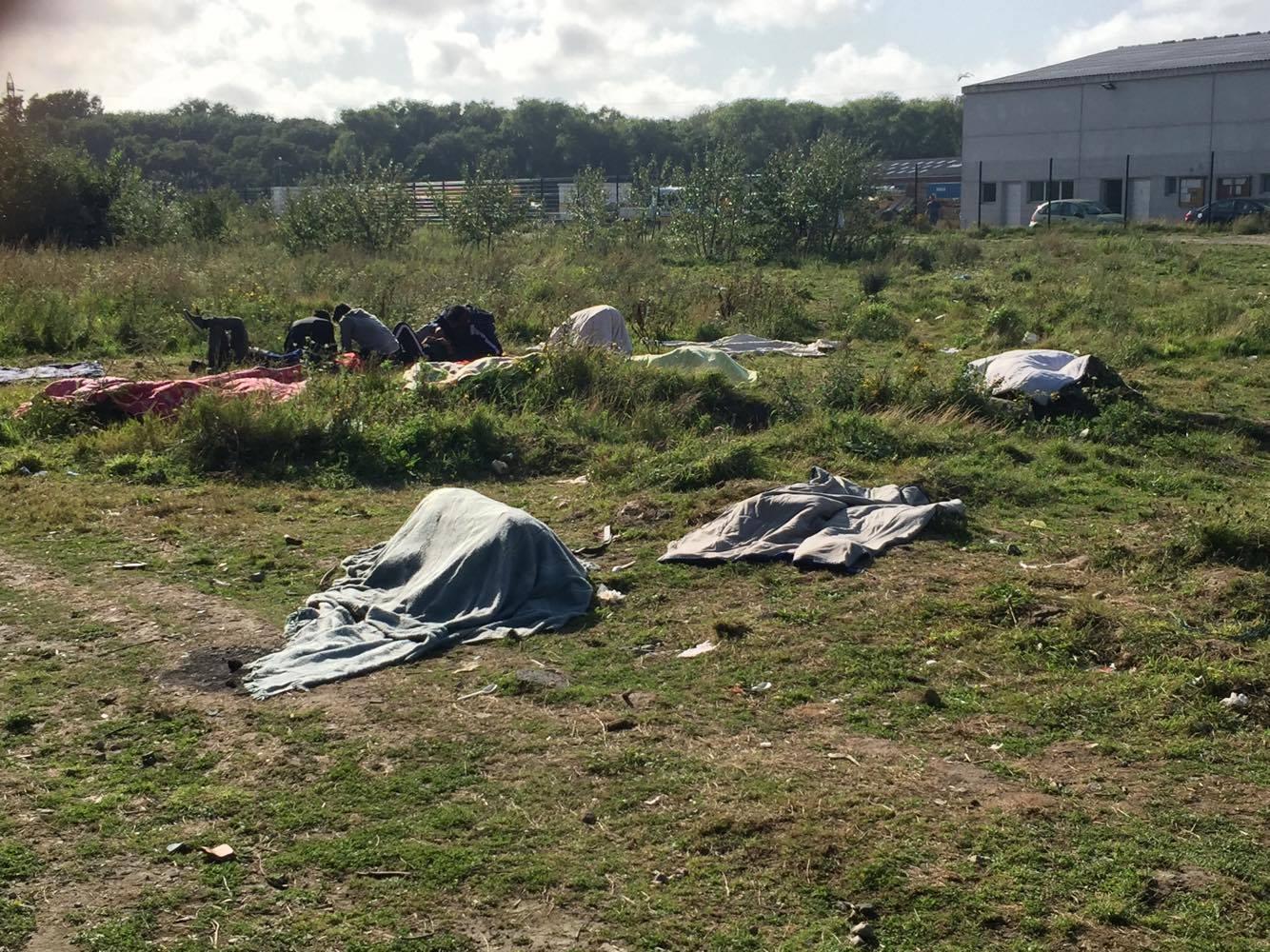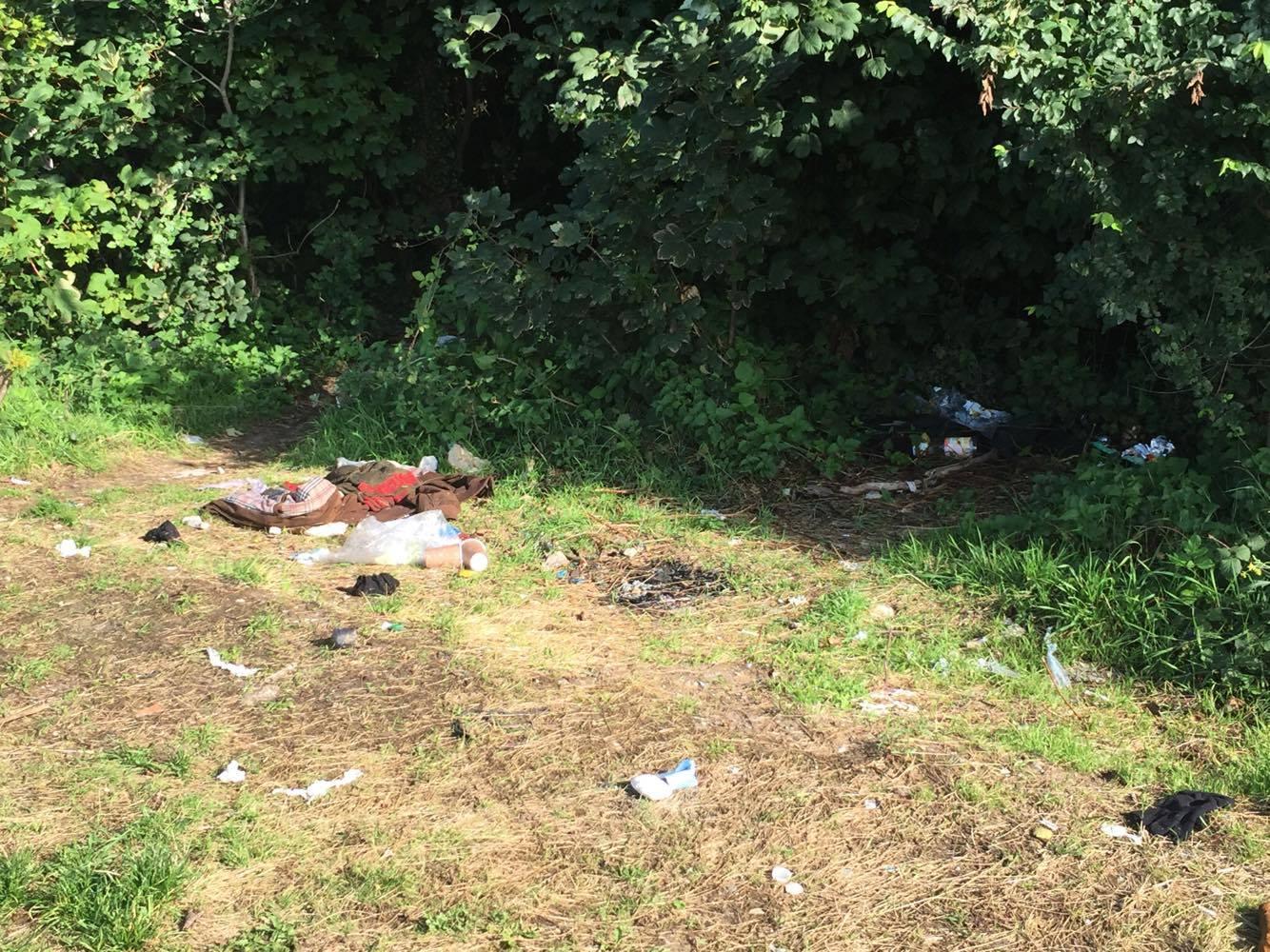Refugees in Calais suffering trench foot as squalid condition take their toll
Scores of children and adults have been diagnosed with the condition, with new cases emerging every day

Refugees in Calais are suffering from trench foot as they are forced to live in squalid conditions without shelter or basic sanitation, The Independent has learnt.
Medics volunteering in northern France have warned that growing numbers of children and adults are being diagnosed with the condition, with new cases emerging every day and the severity reaching levels worse than they have ever seen.
An estimated 700 refugees, including more than 120 unaccompanied children, are currently sleeping rough in Calais and Dunkirk. Following the demolition of the Jungle camp last year, any makeshift shelters or settlements have been destroyed by police, leading to a situation where refugees are sleeping in bare woodland and often exposed to damp, insanitary and cold conditions for long periods of time.
Jon Turvey, a medical student volunteering with charity Help Refugees in northern France, told The Independent he is seeing multiple cases of trench foot everyday, and estimates that at least half of refugees in the region are suffering from the condition or severe fungal infections on their feet.
“There are a lot of feet problems, especially as this summer has been very wet. I’ve seen trench foot in a few of the places I’ve worked in, but the cases of it here are the worst I’ve ever seen,” he said.
“It is often combined with athletes’ foot, and people are also suffering from really bad feet fungal infections. It’s like when you go to the swimming pool and get soggy fingers, but on another level.”
The term “trench foot” originally stems from the condition suffered by soldiers in trenches during the First World War, which were coincidentally quite prominent around Calais and Dunkirk. It occurs when feet are exposed to water for weeks on end and unable to dry out, leading them to become numb, change colour and swell, and, if left untreated, can cause gangrene and possible foot amputation.

“Seeing trench foot on a soldier in a war is one thing, but seeing it on a 15-year-old boy or a six-year-old girl with it is completely unacceptable in the modern world, let alone in a developed country like France,” Mr Turvey continued.
“The potential for complications of gangrene and surgical debridement as the cases become more severe is highly likely, and it’s likely to happen at some point, especially with winter and colder wetter nights in sight.
“I’ve known of cases of trench foot cropping up here and there in the recent decades, often among homeless populations, but nowhere near on the scale that is being seeing among refugees in northern France, particularly with the torrential rain this year.”
Mr Turvey, who worked in the Jungle last year before the site was demolished, said spending prolonged periods of time outside also means refugees were suffering from scabies and pressure sores from sleeping on hard ground, as well as wounds caused by attempts to mount lorries in the desperate pursuit to reach the UK.
“A lot of refugees, including kids, have got pressure sores around their groin area and on their bottoms from where they’ve been sleeping on hard ground and bushes. Some of them have got really serious from where they’ve become infected,” he said.
“There’s also a lot of Leishmaniasis, a tropical skin infection that gives them angry-looking ulcers that will leave life-long scars. And we do a lot of wound management, from grazes from falling over on the motorway to getting caught on barbed wire, to getting hit by trucks.”
In the Jungle, there were several medical caravans, where volunteers were able to give people relevant medication where they could and write medical referral letters to push people onto clinics. But the absence of a fixed point and a lack of resources has meant medical volunteers are now limited to working from the back of car.

With no means of cleaning their clothes except in dirty water, and not enough socks to go around in the charity donations, refugees are routinely wearing damp clothing, causing trench foot and other conditions to worsen. Any attempts to provide treatment for skin infestations such as scabies are not working, because, on returning to the squalor, people are re-infected within days or weeks, volunteers said.
French state medical services generally refuse to treat refugees with conditions that are not immediately life-threatening, and people are reportedly often ignored or escorted out by police when they go to local hospitals suffering from trench foot and other conditions, which in turn makes many unwilling or afraid to go back.
“This morning, I saw a group of boys who had been refused treatment in A&E the night before. They had quite serious conditions, but the doctors and medical staff wouldn’t see them,” Mr Turvey said.
“It happens a lot. They get kicked out and the police might get called. They’re then scared they will be arrested or hurt by the police, so a lot of them won’t take our instructions to go to hospital. We’re then stuck in this situation where we’re diagnosing conditions that are going to progress, but aren’t able to get them treated.”
Coupled with their rapidly declining physical health, the mental wellbeing of refugees in the Calais region is said to be at an all-time low, with self-harm becoming increasingly common among both adults and children.
Medical professionals and voluntary child protection officers told The Independent people frequently have self-inflicted razor blade cuts and cigarette burns on their skin. Unaccompanied minors are a particular concern, with the number displaying destructive behaviours rising at an alarming rate.

Sandy O’Brien, who’s been volunteering with the Refugee Youth Service for more than a year, said: “Self harm is really, really common. The majority of kids display destructive behaviours towards themselves, whether it’s smoking, drinking, or the more serious cases of serious self harm.
“We’re seeing kids who very obviously have signs of depression, very low moods, and the longer that kids are here, the more these behaviours become predominant.”
She explained that when young people first arrive in Calais, they are often unaware of the challenges it will entail, but begin to show a “slow deterioration of spirit and positivity” as they become increasingly tired and worn down, leading them to turn to escapist behaviours.
“Looking for control often leads to the self harm. They’re in control of nothing here. They’re moved on by the police and pepper sprayed by them. They’re constantly on the move,” she continued.
“In the Jungle camp there were spaces they could go to relax and spaces they could be around other children, but now that there’s no camp there’s just this big blurriness. There’s no outside and inside, they’re just constantly in motion."
The Refugee Youth Service currently has around 130 under-18s on their database, including between 40 and 50 15-year-olds and around a dozen who are aged 13, while the rest are either 16 or 17. There is also an eight-year-old boy and a five-year-old girl on the database who are sleeping rough accompanied by their mothers.
“Even just tracking the kids is so much harder than it was before. Before, you had a shelter number, you had groups of friends that would always come,” Ms O’Brien said.
“But now simply trying to keep hold of how many kids we have takes up so much of our time, taking away from the more important stuff. They should all really be having daily check-ins with someone, but it’s just not a service we’re able to provide.”
At the end of July, the French government said it would provide water and sanitation to displaced people in Calais and open two reception centres away from the port after a court ordered it to end the inhuman treatment of refugees.
Last week, the authorities announced that they had delivered on these pledges, but while a number of sanitation facilities have been put in place, volunteers said it is still the “bare minimum” and is not sufficient for more than 700 refugees.
A mobile water tank with 10 taps was installed, which is open for five hours a day, and 10 portable toilets were placed at the distribution point, but with no hygiene items provided. Two showers have also been installed at the hospital, but are limited for the use of women, children and those with recognised health conditions.
Annie Gavrilescu, regional manager for Help Refugees, said: “The Calais authorities seem to be making efforts to improve living conditions for 750 refugees in Calais, but the provisions so far are absolutely minimal and tokenistic. The court order has not been meaningfully implemented.”
A spokesperson for the Prefecture of the Nord-pas-de-Calais region said: “Mobile facilities have been provided to improve conditions for migrants, while maintaining the objective reaffirmed by the public authorities and validated by the administrative judge not to reconstruct a camp in the Calais region and to avoid an uncontrolled influx of migrants.
“In addition, a shower facility already exists for the most vulnerable people (sick, women, children, the elderly, disabled people), which will be expanded before the end of August and will be accessed on the guidance of social workers or public health actors.
“These installations are not fixed; they can evolve according to realities and needs.”
Join our commenting forum
Join thought-provoking conversations, follow other Independent readers and see their replies
Comments
Bookmark popover
Removed from bookmarks